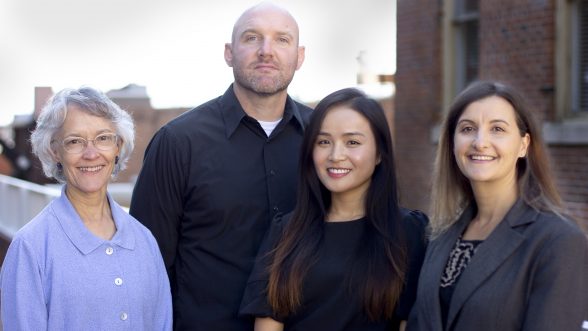
Whether it’s your first semester at the CU Denver Business School or your last, advisors are here to help you navigate your academic career. They do more than just set up your class schedule, they find solutions to problems and find ways to save you time, money, and stress.
“I enjoy the ability to build a relationship with students from start to finish of their time in the Business School. I love when I can provide students with options that they did not even know existed,” says Ty Haley, undergraduate advisor.
Advising offers more services than you’d expect. Here are a few ways advising can help you thrive during your time at the Business School.
Finding Solutions for Students
The CU Denver Business School has a diverse student body, and each student has a different set of needs. Advisors work with you to customize degree plans to fit with your life. “We are here to help you solve problems,” says Paula Wallace, Director of Graduate Advising. “If there’s something impacting your ability to register, do well in a specific course, or progress through your degree requirements, we’re happy to help.”

Left to Right: Ty Haley, Clair Sims, Courtney Burkett, Jamie Osckel, Justice Jacobs
“We serve as advocates for your overall success at the Business School and CU Denver. By meeting with your academic advisor, you’ll feel confident taking control of your academic journey,” says Justice Jacobs, undergraduate advisor. The advising team is a critical resource for you to stay on track with your academic goals. They provide a better understanding of degree requirements, so you save time and money. If you are thinking about adding a second major or minor, they can tailor your degree to fit your graduation plan without adding excess credits. Advisors also have pertinent information regarding modified grading policies or grade replacement options to ensure your GPA stays competitive.
Checking In
Undergraduate Advising recommends you check in once a semester to ensure you’re taking the right classes and moving in the right direction in your program. You don’t necessarily need to schedule an appointment to check in, you can simply email the advising team with any questions or concerns.
“For graduate students, I would suggest checking in with an advisor at least three times: once at the beginning to make sure you are getting started off on the right foot, mid-stride of your program to ensure you are going in the right direction, and a semester or two before your anticipated graduation to confirm you are on track to meet that goal,” suggests Paula Wallace, Director of Graduate Advising. You can request a 30-minute phone call or Zoom meeting to address complex topics or you can check in with graduate advising through email.
Preparing for Your Appointment
When you’re getting ready for an advising appointment, the first step is to make sure your CU Denver email is activated and you’re checking it regularly. This will be the way your advisor communicates with you. Second, schedule an appointment with an undergraduate or graduate advisor. Finally, pay attention to the important dates on the academic calendar. Advisors are busiest at the beginning and the end of the semester and during registration, so it’ll be easier to find an appointment during the middle of the semester.
“It’s helpful for you to think about your educational goals before the appointment so we can discuss those goals together,” says Melissa Galvagni, graduate advisor. “We recommend you prepare a list of questions to ask too, so we don’t miss anything.”

Left to Right: Paula Wallace, Andrew Jacobsen, Cher (Duyen) Vo, Melissa Galvagni
You should consider when you’d like to graduate and how many credits you’re comfortable taking each term. It is also important to know whether remote, on-campus, or hybrid classes are better for your schedule. Many students are juggling a job (or two), family, and other responsibilities. Advisors are here to help you find balance between life and school and ensure that you flourish in your courses.
What to Expect During Your Appointment
“During your academic advising appointment, we will review any questions you have and discuss your course options for the upcoming semester. In addition, we can review your major, minor, and certificate opportunities as well as general questions related to the Business School,” says Justice Jacobs, undergraduate advisor.
Recent events, including the Covid-19 pandemic, have caused a lot of stress and uncertainty. During your advising appointment, you should address any concerns, especially if you’re struggling in a course. “Academic advising is a two-way street, so we encourage you to be engaged in the advising process. Be honest during your appointment, let us know if you’re struggling so we can help you find solutions,” says Melissa Galvagni, graduate advisor.
Advice for New Students
As a new student, you may feel overwhelmed from the pressure to commit to the right major or being around new people. Advisors are always here as resources to help you confidently begin your academic journey by laying out all the options. “I think the best advice we can give to new students is to know and use your campus resources. This doesn’t just mean some of the student services offices on campus, which there are many and they are great, but also using fellow students and faculty as resources as well. Doing so can provide you with additional learning and growth opportunities beyond what you get in the classroom alone,” says Andrew Jacobson, graduate advisor.
College is an exciting time in many students lives, but for some it can intimidating. You can make the most of your time at the Business School by getting involved with student clubs and organizations. “Take full advantage of all the opportunities around you, there are so many great ways to build your resume and extend your community and professional network!” says Justice Jacobs, undergraduate advisor.
Advice for Graduating Students
Congratulations! After years of hard work and dedication, you have made it to the end of your academic journey. However, there are a few last steps to complete before graduation: Meet with an adviser one last time to ensure you have met your degree requirements, apply for graduation, and if you want, register to participate in the commencement ceremony.
“One bit of advice I can offer to graduating students is to continue those connections you made as a student in your program. By keeping in touch with your classmates and professors, you can continue those relationships beyond your program and find opportunities in the future,” says Andrew Jacobson, graduate advisor.
You leave the CU Denver Business School with more than just a degree, you leave with connections to the community and a network of like-minded professionals. “To all of my graduating students: make sure to take all of the valuable skills and lessons that you learned here with you, not just what you learned from textbooks. This includes things like critical thinking skills, interpersonal communication, emotional intelligence, and empathy for others,” says Clair Simms, undergraduate advisor.
After graduation, students can continue learning, growing, and creating meaningful connections by joining the Business School Alumni Network (BSAN) which offers exclusive programs and opportunities for CU Denver alumni.
Get Started Today
It’s never too early or too late to take advantage of the Business School advising team. Whether you’re a brand-new student or approaching the finish line, schedule an appointment with undergraduate or graduate advising today.


